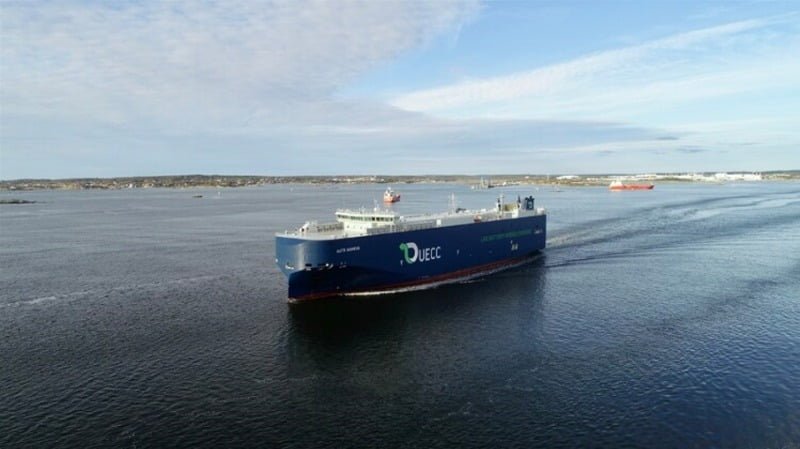United European Car Carriers (UECC) has announced a groundbreaking agreement with Titan Clean Fuels to secure liquefied biomethane (LBM), marking a significant leap in its efforts to decarbonize its fleet. Under the deal, Titan will provide ISCC-EU certified mass-balanced LBM, or bioLNG, at the Port of Zeebrugge, with a minimum supply of 12,000 tons for 2025. This initiative is expected to cut UECC’s greenhouse gas (GHG) emissions by over 75,000 tons in 2025, representing roughly one-third of its annual emissions from vessel operations.
This agreement builds on the ‘Sail for Change’ initiative launched earlier this year, which has attracted major automotive manufacturers, including Toyota and Ford, to embrace low-carbon LBM for maritime transport.
Table of Contents
A Decarbonization Milestone
UECC CEO Glenn Edvardsen described the deal as a “massive leap towards decarbonization,” emphasizing its alignment with customer sustainability goals and compliance with upcoming regulations such as FuelEU Maritime and the EU Emissions Trading System (EU ETS).
“With this pact, we are securing sustainable fuel supplies to maximize the emissions reduction potential of our dual-fuel LNG vessels. It’s a critical step toward our 2030 target to cut GHG intensity from fuel use by 45%,” Edvardsen stated.
The use of LBM is projected to eliminate 75,000 tons of Scope 1 well-to-wake emissions, adding to the company’s substantial progress last year when 60,000 tons of emissions were reduced through increased biofuel and LNG usage.
Why LBM?
UECC’s Energy & Sustainability Manager Daniel Gent highlighted the advantages of LBM, noting its sustainability credentials, technical feasibility, and growing availability. LBM’s potential for net-zero or even net-negative emissions, factoring in avoided waste emissions, makes it a compelling choice for immediate decarbonization.
“LBM offers a cost-effective solution to meet regulatory carbon intensity limits and enhance green compliance. This benefits our clients by reducing their Scope 3 emissions and mitigating costs linked to new regulations,” Gent said.
Road to Fossil-Free Operations
UECC plans to achieve 20% LBM usage across its 15-vessel fleet by 2030, supplemented by 17% biofuel and 20% LNG usage, with alternative fuels expected to make up 55% of its fuel mix. The company is also exploring e-methane as a renewable fuel option to meet 10% of gas demand by 2025.
The sustainability push includes eco-friendly fleet expansion, with two multi-fuel battery hybrid vessels set for delivery in 2028, alongside options for two more.
“We are well on the way towards achieving our ambition of phasing out the use of fossil oils in our fleet and achieving net-zero by 2040,” Edvardsen concluded.
About Titan Clean Fuels
Titan Clean Fuels is a leading independent supplier of low-emission, zero-emission, and net-zero fuels, including LNG, LBM, and hydrogen-derived e-methane, to the shipping sector. Based in Amsterdam, Titan has been a pioneer in the clean fuels market for over a decade, supporting industries with environmentally sustainable fuel solutions.
About UECC
United European Car Carriers (UECC) is a key player in sustainable short-sea RoRo transportation across Europe. Operating a fleet of Pure Car and Truck Carriers, UECC provides door-to-door supply chain solutions and manages vehicle terminals in major European ports. Headquartered in Oslo, Norway, UECC is at the forefront of integrating sustainability into its maritime operations.
Source UECC

